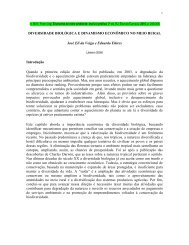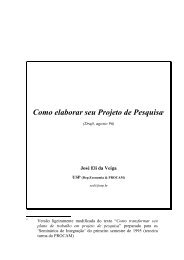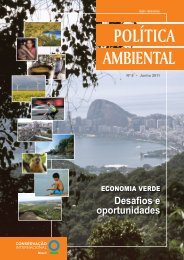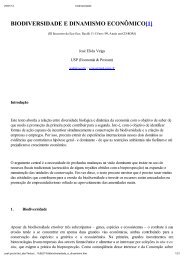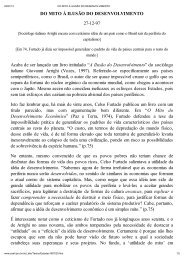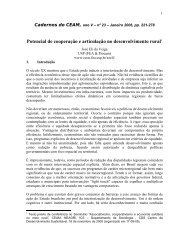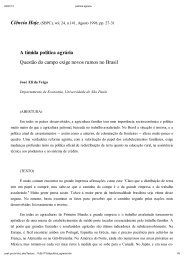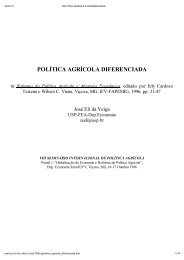sustainable development 20 years on from the ... - José Eli da Veiga
sustainable development 20 years on from the ... - José Eli da Veiga
sustainable development 20 years on from the ... - José Eli da Veiga
Create successful ePaper yourself
Turn your PDF publications into a flip-book with our unique Google optimized e-Paper software.
68<br />
producti<strong>on</strong> will, however, heighten competiti<strong>on</strong> with o<strong>the</strong>r sectors of <strong>the</strong> livestock industry, and <strong>the</strong><br />
expansi<strong>on</strong> of intensive producti<strong>on</strong> systems for poultry, pork, <strong>da</strong>iry products —and, now, to a lesser extent,<br />
beef— increases <strong>the</strong> potential for air and water quality problems due to excess nutrient accumulati<strong>on</strong>s in<br />
c<strong>on</strong>centrated producti<strong>on</strong> systems (ECLAC/FAO/IICA, <str<strong>on</strong>g>20</str<strong>on</strong>g>11).<br />
Aquaculture in <strong>the</strong> regi<strong>on</strong> has grown at three times <strong>the</strong> world rate in recent <str<strong>on</strong>g>years</str<strong>on</strong>g> and has also<br />
posed envir<strong>on</strong>mental challenges. One of <strong>the</strong> main problems, which has been an issue since <strong>the</strong> 1980s, is<br />
<strong>the</strong> clear-cutting of mangrove forests to open <strong>the</strong> way for <strong>the</strong> c<strong>on</strong>structi<strong>on</strong> of shrimp p<strong>on</strong>ds, with <strong>the</strong><br />
acquiescence of local governments and without regard for <strong>the</strong> associated envir<strong>on</strong>mental impacts.<br />
Ecologically, mangroves act as a vital natural protective barrier and buffer z<strong>on</strong>e against extreme events<br />
such as tsunami. Thus, <strong>the</strong>y are a central element in protecting human lives, material assets and ec<strong>on</strong>omic<br />
activities and dwellings (ISDR, <str<strong>on</strong>g>20</str<strong>on</strong>g>11b). The destructi<strong>on</strong> of mangroves has triggered ecological crises that<br />
have hurt <strong>the</strong> shrimp industry (which, in Ecuador, for example, has taken more than a decade to recover)<br />
and have had a serious impact <strong>on</strong> local ec<strong>on</strong>omies. A similar situati<strong>on</strong> occurred in Chile with <strong>the</strong><br />
expansi<strong>on</strong> of salm<strong>on</strong> farming, which set off an ecological crisis that wiped out thousands of jobs and<br />
caused heavy ec<strong>on</strong>omic losses. Similar problems have arisen in <strong>the</strong> farming of o<strong>the</strong>r species, such as<br />
tilapia. These experiences point to <strong>the</strong> urgent need to adopt envir<strong>on</strong>mentally sound approaches to <strong>the</strong><br />
management and <str<strong>on</strong>g>development</str<strong>on</strong>g> of coastal resources and <strong>the</strong>ir ecosystems (ECLAC/FAO/IICA, <str<strong>on</strong>g>20</str<strong>on</strong>g>10).<br />
Nearly 73% of all water use in Latin America and <strong>the</strong> Caribbean is accounted for by <strong>the</strong><br />
agricultural sector, and <strong>the</strong> amount of irrigated land is increasing. The str<strong>on</strong>gest envir<strong>on</strong>mental impact of<br />
<strong>the</strong> expansi<strong>on</strong> of <strong>the</strong> land area under cultivati<strong>on</strong>, and <strong>the</strong> water use that this entails, is <strong>the</strong> polluti<strong>on</strong> of<br />
groundwater and surface water (see chapter II). 18<br />
In envir<strong>on</strong>mental terms, <strong>the</strong> agricultural sector is generally under-regulated. M<strong>on</strong>itoring <strong>the</strong><br />
envir<strong>on</strong>mental impacts of agricultural activities is complicated because those impacts are quite disparate<br />
and producers frequently change <strong>the</strong>ir producti<strong>on</strong> practices <strong>from</strong> <strong>on</strong>e area to ano<strong>the</strong>r and over time. Some<br />
recent changes, such as <strong>the</strong> expansi<strong>on</strong> of organic agriculture and <strong>the</strong> increased use of product certificati<strong>on</strong>,<br />
as well as public/private initiatives such as <strong>the</strong> moratorium <strong>on</strong> soy producti<strong>on</strong> in Brazil, 19 attest to <strong>the</strong> fact<br />
that <strong>the</strong> market is exerting pressure <strong>on</strong> producers to use more <str<strong>on</strong>g>sustainable</str<strong>on</strong>g> practices. According to statistics<br />
cited in Willer and Kilcher, 8.1 milli<strong>on</strong> hectares of land in Latin America are exploited as of certified<br />
organic farms (23% of <strong>the</strong> world total)and <strong>the</strong> regi<strong>on</strong> has 257,238 certified farmers (18.7% of <strong>the</strong> world<br />
total), with an annual growth rate of approximately 1% (Willer and Kilcher,, eds. <str<strong>on</strong>g>20</str<strong>on</strong>g>11). O<strong>the</strong>r advances<br />
include <strong>the</strong> introducti<strong>on</strong> of more sophisticated irrigati<strong>on</strong> techniques —such as drip irrigati<strong>on</strong>— and <strong>the</strong><br />
use of low-water crops and <str<strong>on</strong>g>sustainable</str<strong>on</strong>g> technologies such as bio-composting, small-scale, n<strong>on</strong>-industrial<br />
seed producti<strong>on</strong> and <strong>the</strong> use of biological products for integrated pest and plant disease management.<br />
Some local communities in, for example, Peru and <strong>the</strong> Plurinati<strong>on</strong>al State of Bolivia are also organizing<br />
seed banks (see also chapter II, where reference is made to an experiment being c<strong>on</strong>ducted in Chile).<br />
Family farms, which make a significant c<strong>on</strong>tributi<strong>on</strong> to <strong>the</strong> food supply, can play an important<br />
role in envir<strong>on</strong>mental protecti<strong>on</strong> and local <str<strong>on</strong>g>development</str<strong>on</strong>g>, but <strong>the</strong>y have been largely neglected by public<br />
policy in Latin America and <strong>the</strong> Caribbean (see chapter III). In additi<strong>on</strong>, many women play a key role as<br />
18<br />
19<br />
Source: Aquastat: FAO Informati<strong>on</strong> System <strong>on</strong> Water and Agriculture [<strong>on</strong>line] http://www.fao.org/nr/water/aquastat/<br />
main/index.stm. Date of reference: 28 October <str<strong>on</strong>g>20</str<strong>on</strong>g>11.<br />
Members of <strong>the</strong> main producers associati<strong>on</strong>s in <strong>the</strong> vegetable oils and oilseeds industry in Brazil, which toge<strong>the</strong>r<br />
c<strong>on</strong>trol <strong>the</strong> li<strong>on</strong>’s share of soy producti<strong>on</strong> in <strong>the</strong> country, have agreed to refrain <strong>from</strong> marketing soy or soy products<br />
that have been produced in deforested areas of <strong>the</strong> Amaz<strong>on</strong> biosphere. Brazilian and internati<strong>on</strong>al NGOs and <strong>the</strong><br />
government have all taken part in implementing this moratorium (see [<strong>on</strong>line] www.abiove.com.br).



